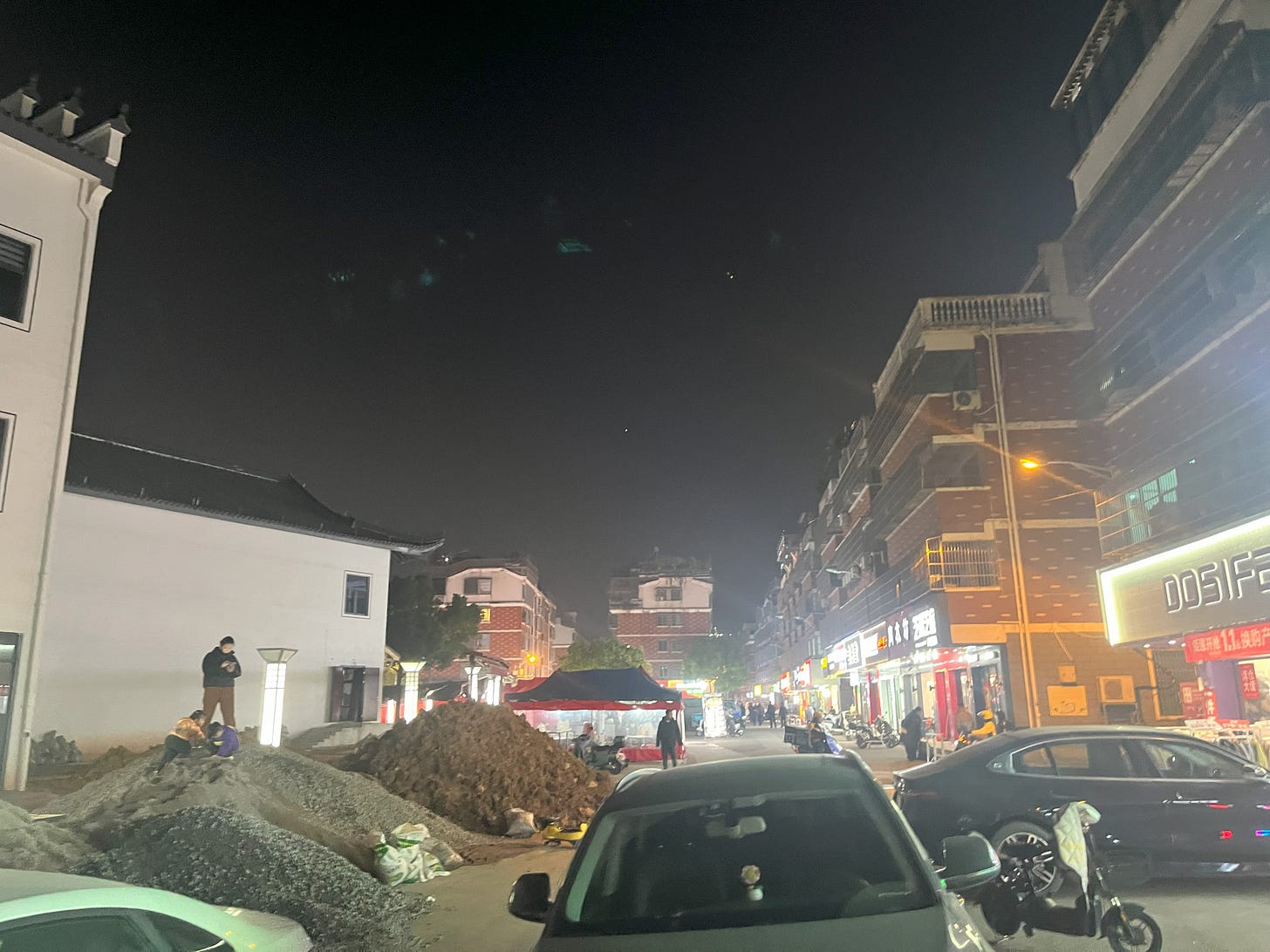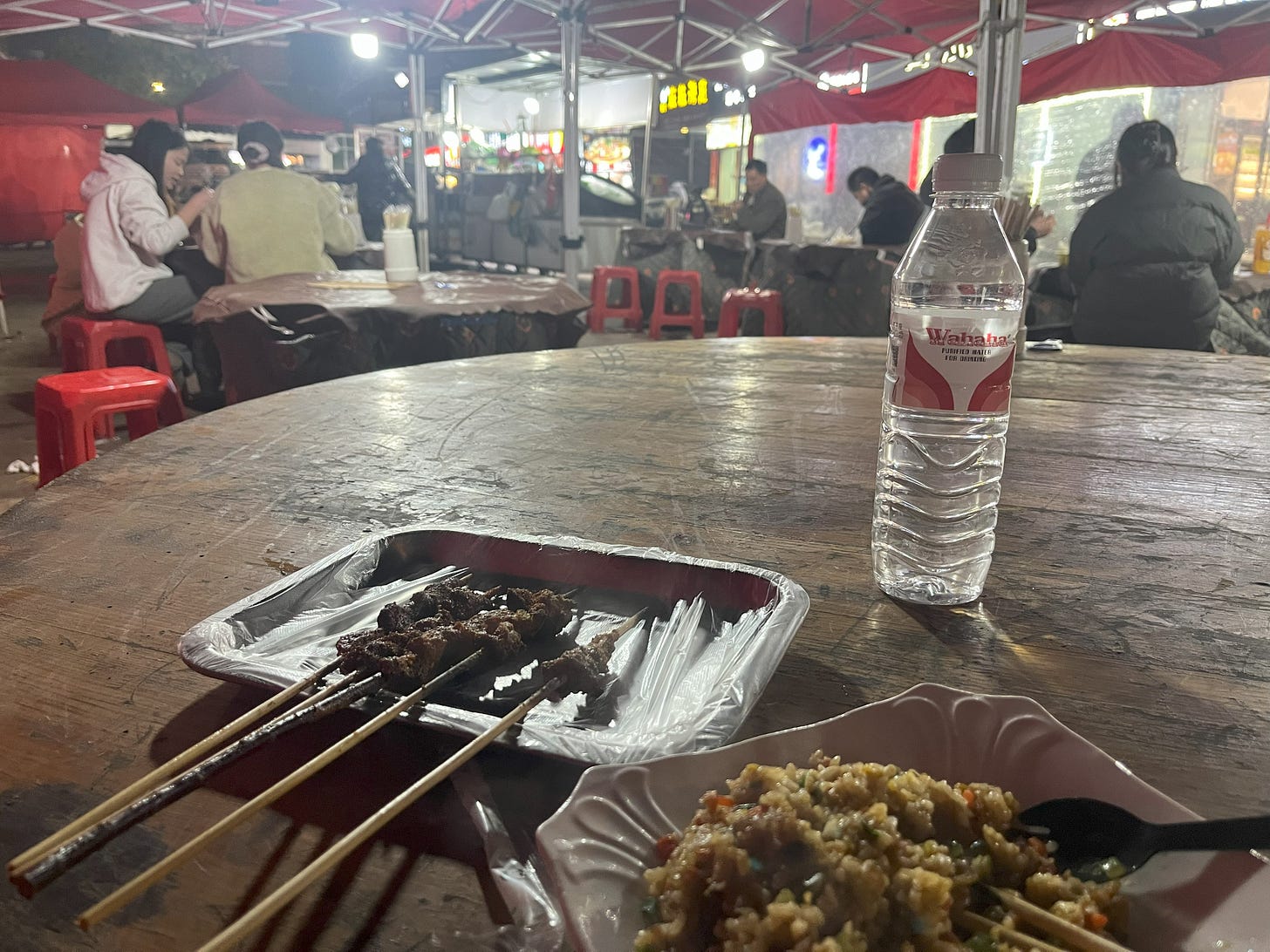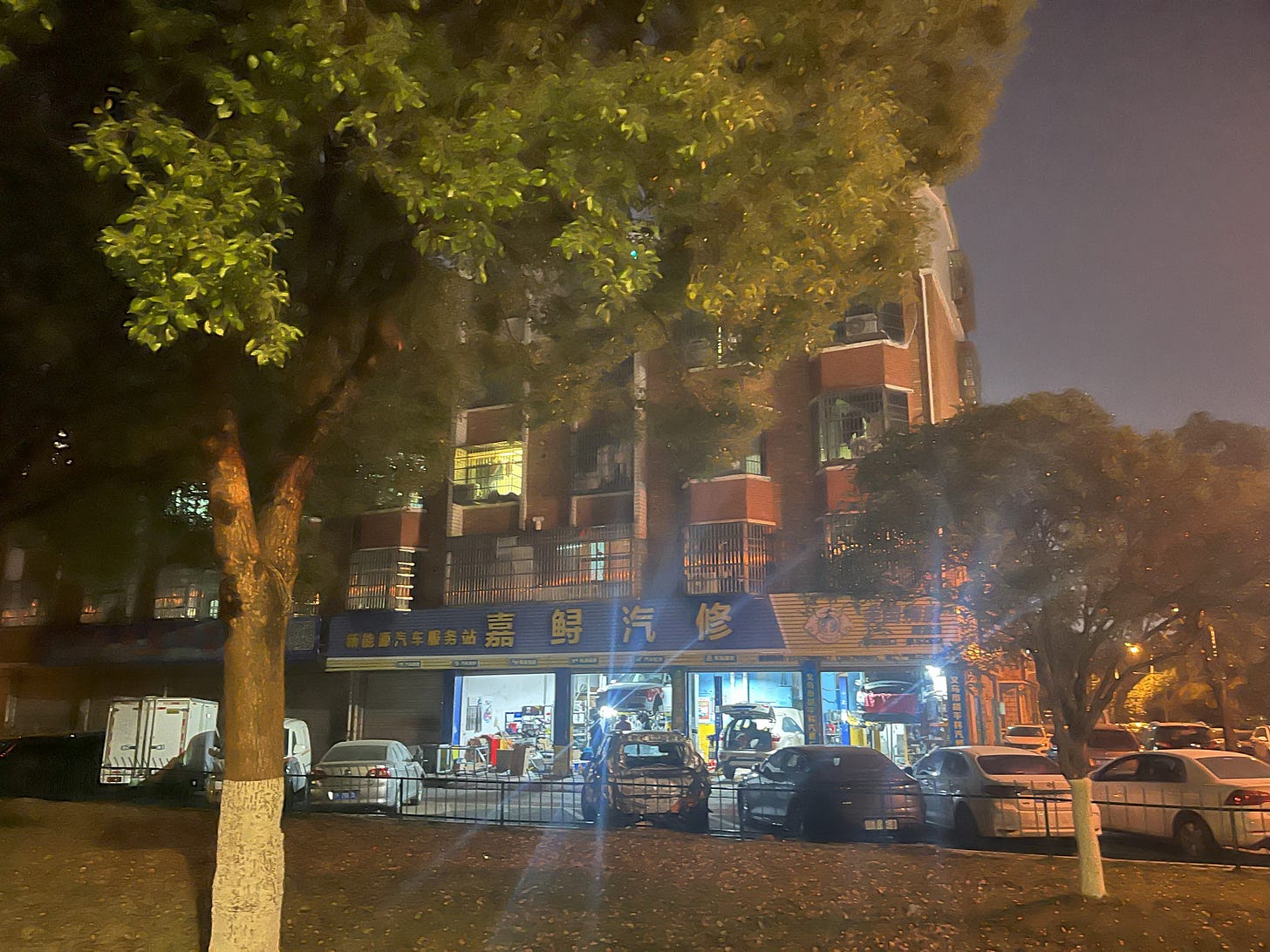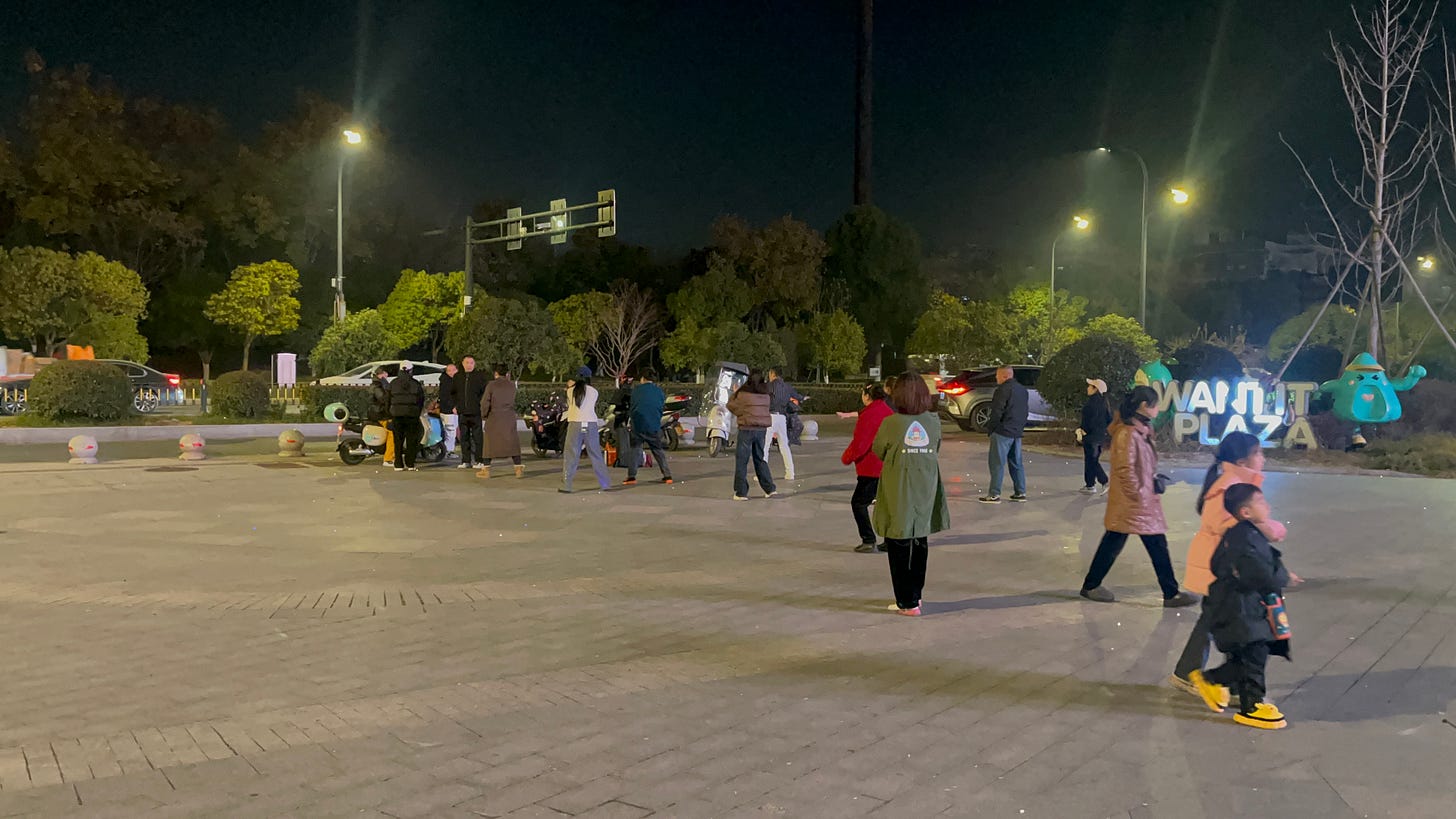Jinyidong (金义东) Trip Part 3: A Dinner Adventure
How trying to get dinner turned into an adventure
Read the previous installment here:
Dinner was supposed to be kind of a simple out and back, but ended up being the best part of the trip. By the time I got back to my hotel room from the international market, I was pretty pooped, so I just laid there and looked at my phone for a while. It was nearly 8 p.m. before I even tried to start looking at where to potentially eat. After looking on Gaode a little, I picked a place called 新会料理 (Xinhui Cuisine, according to Google Translate). I picked it because it looked like the right combination of something local with good reviews. Whether that’s actually true or not, I’ll never know. It was only a 1.4 km, 26 min walk, but I didn’t want to walk since my legs and feet were destroyed. My Didi didn’t work so a hotel worker hailed a Didi for me. She gave me a slip with the last 4 digits of her phone number. Apparently, you have to read it to the 师傅 (like “sir” in English, often used to refer to people who drive vehicles) to confirm that you are the correct rider. That’s a good system.
After I got in, the driver asked me why the hotel worker hailed the Didi for me. This began a long conversation that am going to recount to the best of my ability. The conversation was conducted in Chinese–I simply tried my best. Throughout my time in China, I tried to divulge as few personal details as possible, but some people managed to coax it out of me, like this guy. I found the conversation enjoyable and interesting:
Driver: Why did a hotel worker have to call a Didi for you?
Me: My Didi doesn’t work.
Driver: Why?
Me: I’m a 外国人 (foreigner), so my account isn’t connecting properly.
Driver: Where are you from?
Me: America.
Driver: Your Chinese is very good!
Me: That’s because my parents speak Chinese, and I took classes in college.
Driver: Are you mixed?
Me: No, I am a 华裔美国人 (Chinese-American).
Driver: So your parents are Chinese?
Me: They are American, uhhh [I didn’t know the word for citizen in Chinese. Thankfully, he knew what I was trying to say].
Driver: 美国公民 (American citizens)? What do you do?
Me: I work in a [REDACTED].
Driver: Which one?
Me: A small city called [REDACTED]. I do [REDACTED] which means that I interact with some Chinese people.
Driver: [Assuming that I’m from Yiwu] How long are staying home for?
Me: No, my parents aren’t from here. They’re from 东北 (the northeast of China).
Driver: Then why are you in Yiwu?
Me: Tourism
Driver: 对象?
I was honestly pretty confused by what he meant by this, so he repeated it like twice. 对象 is generally the word for the partner you’re dating, so I ended up just deciding that he was asking if I was here to find a girlfriend.
Me: Ummm no… I don’t have a 对象. I am here because I want to see what it’s like in a Chinese city that isn’t a 1st or 2nd tier city, since anyone and a lot of people go to those. Do a lot of people come here looking for a 对象?
Driver: Oh yeah, a lot, a lot of people. You should find a Chinese girlfriend.
I don’t know what I replied to this, I think I might have something about 缘分 (fate) to just move on from the question
Driver: You should go to Nanjing.
Me: Why?
Driver: Because it is my 家乡!
He was very proud. He gave a general description of how important it was historically in terms of culture and history (most of which I already knew). The following is what stood out enough for me to remember specifically.
Driver (cont.): The city was so important that it is one of only two cities, along with Beijing, to have 京 in its name. Additionally, it was where the worst event in China during World War 2 took place, the Nanjing Massacre.
Me: But if I go there I’d be very… [I was trying to think of the right word]
Driver: 不舒服 (uncomfortable)?
Me: Yes. 生气 (angry).
Driver: No, it’s okay actually. 历史就是历史 (history is just history). [He might have said a little more than this but I don’t remember].
This is a very admirable and forgiving attitude on the part of the driver. I thought about this walking home after dinner: doesn’t “history is just history” make it worse because you have no chance of changing anything anymore? At least, when the event is still occurring and the situation is malleable, you might have the possibility of changing it and exacting justice on the wrongdoers. Now, we can only read about the event and feel angry that the wrongdoers escaped unpunished. The driver has it right, though. There is a lot of pointless bloodshed because of never-ending cycles of revenge perpetrated by people who can’t let go of nationalistic grudges over historical events.
Me: Do you have any specific recommendations?
I forgot the first place he mentioned. Some of this might be wrong or not make sense because of my faulty memory, and he was also trying to dumb it down for me.
Driver: [The first place that I forgot], the 总统’s (president’s) house from the Ming dynasty [I think he basically meant an imperial palace of some sort], and Sun Zhongshan who is a founding father.
Me: … Sun Zhongshan?
Driver: Yes. He was very important. He is a founding father. Without him, women in China would have nothing. Like to put it bluntly, there would be no gender equality and women would have nothing if not for Sun Zhongshan.
Sun Zhongshan is the Mandarin pronunciation of Sun Yat-sen. I knew who Sun Yat-sen is, but I’d never heard of the Mandarin pronunciation. At that time, I wasn’t sure, but I could guess that the driver might be talking about Sun Yat-sen, despite not knowing that he did anything in particular for women.
Me: Okay interesting. Well thank you for the recommendations. I don’t know the Chinese so I am typing them in pinyin. I’m sure once my dad reads them, he’ll know.
Driver: Yes he will absolutely know what I’m talking about, for sure. Where are your parents from, specifically?
Me: [REDACTED] and [REDACTED].
Driver: Did you come on your own [to China]?
Me: Not exactly, my dad and my grandma are in [REDACTED], I am staying with them. But this trip I made on my own. I’m a political science major! I want to see China’s smaller cities, something with Chinese characteristics.
Driver: Oh, you will for sure. The Chinese people very much have their own yuan su. [Maybe he meant 元素? I do not know.]
Me: What is yuan su?
Driver: Okay how do I explain yuan su… uh 调性 (diao xing)?
Me: What’s 调性?
Driver: 调性, how do I explain 调性…
Me: Is it like 个性 (character, characteristics)?
Driver: Yes! You can think of it as 个性.
Right there was when we encountered a roadblock because of some construction, so he let me off. He wished me goodbye many times in many ways and I tried to thank him equally so.

I started walking to 辛会料理, but I got accosted by a lady who’s had this whole 肉串儿 (kebab) and cooking setup outside. It wasn’t even just a cart, it was a bunch of grills just positioned all over half the street. In China, if your glance lingers a second too long on something that’s being sold, you’re going to be aggressively pitched by an employee. Anyways, she seemed nice so I sat and ate her food. I kind of wanted a street food experience anyways. She asked me if I ate yet and I said no, so she listed a few things she made as meals. Egg fried rice sounded pretty basic and I wanted something regular like that, but it was extremely oily so that didn’t taste good. I also picked out 5 kebabs, which were spicy but good. Overall, the experience was great.
Then I walked home since nobody was going to call a Didi for me. At this point, I didn’t mind. This was an opportunity for me to see the city and what China is really like at the ground level of a smaller city.
I loved the experience of making my way through the cramped streets between 4 over 1s. Some of the first floor units had their roll-up door down, but others were up. As I’ve mentioned before in previous installments, a good number were mini-factory setups, with a few people inside still working away at 9 p.m. on a Friday. I even saw a car shop. Others were shabby storefronts with maybe one crusty rack of goods and a person slumped over a small table watching short-form videos. The kind of dumpy interiors were illuminated by the type of signature Chinese bright white lighting makes everything look even more depressing at that hour by casting really stark shadows. I was walking by versions of what I’d seen and described in earlier installments, just with the lighting contrast turned up 5x. It again made me wonder how these people felt about their lives, like how these small stores did any business when people can just walk half a block down to see another single-rack store with the same dusty stuff on the shelves.

Those were the harsher impressions. I also simultaneously passed little scenes that injected some life into the dim streets: a restaurant with the windows all steamed up, people playing basketball, parents out with their kids on a walk, families eating dinner a few steps into their single-rack store, and even a community center full of people who honestly seemed to be in a shouting match, but you never know because Chinese people often sound like they’re fighting when it’s just a regular conversation.

As I got onto the bigger streets near the hotel, I saw housing developments that were not complete and looked completely dark. I’ve seen some of these around China, which I’m not sure if they’re evidence of the issues China has been having with its real estate market. In the plaza just outside my hotel, they were doing 广场舞 (plaza-dancing), a classic Chinese activity. It’s not really a viable thing in American suburbs, but I think more Americans should do similar things to build community.
I think a lot of people who are here in this place must know that they’ll be here all their lives. I can’t imagine that to be a good feeling: I would find it hard to get up every morning if I knew that where I started was where I’d always be, not by choice. Where would I get the motivation that I currently do from the good possibility of changing my circumstances? It’s part of the privilege of being in a developed country with relatively less structural barriers to freedom of movement that I don’t exactly feel this way about my own situation. Yet these people clearly work a million times harder than I do. I don’t think most people here are unhappy. Their conditions are probably much improved from when they grew up a generation ago, children bring motivation and happiness, and sometimes daily drudgery can be comforting. Whatever it is, I’m not going to pretend to know or understand what they feel. Humans are tough, and people have a way of making good of their situations wherever they are.









